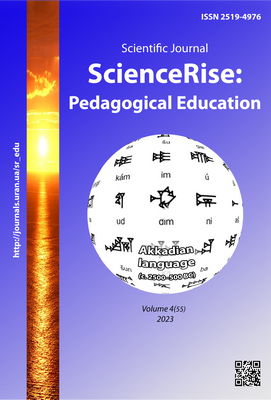Principles of formation of the foreign language communicative competence of specialists in ship handling in the context of lifelong learning
DOI:
https://doi.org/10.15587/2519-4984.2023.289172Keywords:
professional training, foreign language communicative competence, specialists in ship handling, lifelong learningAbstract
The article analyses the basic principles underlying the modernisation of professional training of specialists. On the basis of the analysis, it is substantiated that the formation of the foreign language communicative competence of specialists in ship handling in the context of lifelong learning is a process, focused on the implementation of the tasks of developing a linguistic personality capable of carrying out independent communicative activities in an integrated multicultural environment, working with information in the system of foreign language linguistic culture and using it for personal and professional purposes. The process of formation is effective if the following principles of are observed: axiologisation (involves the development of skills to build speech behaviour adequate to the socio-cultural characteristics of the linguistic society); consistency and systematicity (ensured by methodologically and psychologically sound construction of programmes and manuals, as well as observance of the sequence of transition from simple to complex in the educational process); interdisciplinary integration (involves the formation of special knowledge, skills and abilities, taking into account interdisciplinary links, integration of teaching English and technical maritime disciplines); reflexivity (involves a conscious attitude to the learning process and mastering the techniques of self-assessment and building independent work); communicative (involves the formation of the foreign language communicative competence of specialists on the basis of transfer to the real environment); individualisation (taking into account the level of abilities, development of personal potential and individuality of cadets, understanding and response of the teacher to the needs of students); continuity (purposeful and gradual combination of individual stages of professional development)
References
- Kontseptualni pidkhody do rozvytku bahatorivnevoi pedahohichnoi osvity v Ukraini (2011). Kyiv: NPU imeni M.P. Drahomanova.
- Kobernyk, O. M. (2015). Formation of the students’ training and cognitive activity in the implementation of problem-based learning technology. Professional Education: methodology, theory and technologies, 1, 72–82.
- Radkevych, V. (2021). Modernization of professional (vocational) education in accordance with the needs of society and the requirements of the labour market. Professional Pedagogics, 2 (23), 4–18. doi: https://doi.org/10.32835/2707-3092.2021.23.4-18
- Smyrnova, I. M. (2018) Teoretychni metodychni osnovy profesiinoi pidhotovky maibutnikh uchyteliv tekhnolohii do rozroblennia i vykorystannia elektronnykh osvitnikh resursiv. Kyiv, 709.
- Hlikman, S. (2018). Model of functioning of professional qualities of future navigators in the process of special training. ScienceRise: Pedagogical Education, 5 (25), 9–13. doi: https://doi.org/10.15587/2519-4984.2018.134694
- Lipshyts, L. (2019). Approaches and principles of formation of sociocultural competence of future navigators of international voyages. Young Scientist, 7.2 (71.2), 15–17.
- Zheliaskov, V. Ya. (2020). Theoretical and methodical principles of future navigators’ training in higher marine educational establishments for professional communicative interaction. Khmelnitsky, 545.
- Barsuk, S. L. (2016). Pedagogical conditions of formation of foreign professional communicative skills of future navigators based on Communicative and Cognitive approaches. Kherson.
- Smelikova, V. B. (2017). Preparation of future navigators for professionally-oriented communication by means of case-technologies. Kherson, 305.
- Danylenko, O. B. (2020). Neperervna profesiina pidhotovka maibutnikh sudnovodiiv u vyshchykh morskykh navchalnykh zakladakh: teoriia i praktyka. Zaporizhzhia: AA Tandem, 564.
- Nitenko, O. V. (2015). Inshomovna pidhotovka fakhivtsiv prava v trytsyklovii systemi vyshchoi osvity: yevropeiskyi dosvid. Kyiv, 446.
- Valentyna, K., Iryna, S. (2019). Standard maritime communication phrases as a training need. Pedagogical Sciences, 88, 104–109. doi: https://doi.org/10.32999/ksu2413-1865/2019-88-17
- Osvitno-profesiina prohrama «Navihatsiia i upravlinnia morskymy sudnamy» (2018). Nakaz MON Ukrainy No. 1239. 13.11.2018.
- Shvetsova, I., Moroz, O. (2020). Professionally-oriented communicative competency of seafarers. Zeszyty Naukowe Wyższej Szkoły Technicznej w Katowicach, 12, 173–184.
- Mykhailova, L., Zhyla, H. (2023). Principles of organizing individual work of students of non-language schools. Humanities Science Current Issues, 3 (60), 125–129. doi: https://doi.org/10.24919/2308-4863/60-3-19
- Melnychuk, S., Shvetsova, I., Luts, L., Franko, I. (2021). Theoretical fundamentals of study of values and value orientations in management of psychological scientific space. Journal of Management Information and Decision Sciences, 24 (2), 1–6.
Downloads
Published
How to Cite
Issue
Section
License
Copyright (c) 2023 Iryna Shvetsova

This work is licensed under a Creative Commons Attribution 4.0 International License.
Our journal abides by the Creative Commons CC BY copyright rights and permissions for open access journals.
Authors, who are published in this journal, agree to the following conditions:
1. The authors reserve the right to authorship of the work and pass the first publication right of this work to the journal under the terms of a Creative Commons CC BY, which allows others to freely distribute the published research with the obligatory reference to the authors of the original work and the first publication of the work in this journal.
2. The authors have the right to conclude separate supplement agreements that relate to non-exclusive work distribution in the form in which it has been published by the journal (for example, to upload the work to the online storage of the journal or publish it as part of a monograph), provided that the reference to the first publication of the work in this journal is included.







